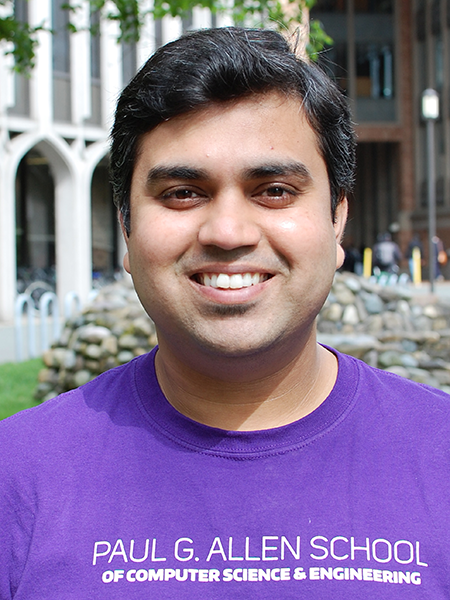
Allen School alumnus Aditya Vashistha (Ph.D., ‘19) received the 2020-2021 WAGS/ProQuest Innovation in Technology Award from the Western Association of Graduate Schools for his doctoral dissertation on “Social Computing for Social Good in Low-Resource Environments.” The award recognizes a graduate thesis or dissertation that presents an innovative technology with a creative solution to a significant problem.
Vashistha, now a computing and information science professor at Cornell University, completed his Ph.D. working with professor Richard Anderson in the Information & Communication Technology for Development (ICTD) Lab on social computing technologies for underserved communities in low-resource environments. His dissertation focused on designing, building and evaluating new computer technologies to include people who are often excluded from social computing platforms because they are too poor to afford smartphones, too remote to access the internet or too low-literate to navigate all the text on the internet.
“Being born and raised in India where illiteracy, poverty, and social ills were just a stone’s throw away, I witnessed how non-reading people, low-income women, and people with disabilities struggled with digital inequity and social injustice,” Vashistha said. “These experiences have profoundly motivated me to build computing technologies that include people of all backgrounds in the information revolution, particularly marginalized communities who are often neglected by the designers and builders of mainstream technologies.”
The first step in his journey began while working with Bill Thies of Microsoft India. Vashistha created IVR Junction, a system that uses interactive voice response (IVR) technology to enable people with basic phones to participate in voice-based social networks. Deployed in remote regions of Somalia, Mali and India, IVR Junction gave communities a way to share news, call attention to rights violations and report lack of services. Given the explosive growth of these systems, Vashistha then focused on Sangeet Swara, an interactive voice forum that enables people in these rural areas to moderate and manage the content generated in local languages which are yet unsupported by advances in natural language processing. The paper presenting Sangeet Swara earned a Best Paper Award at the 2015 ACM Conference on Human Factors in Computing Systems. Vashistha subsequently earned an Honorable Mention at the CHI 2017 for his work on Respeak, a voice-based speech transcription that relies on crowd-sourcing and speech recognition to transcribe audio files while providing additional earning opportunities to low-literate people without access to smartphones and internet connectivity.
In addition to building voice forums for all people, Vashistha studied how technology amplifies existing sociocultural norms and values in society, including its strengths, shortcomings and biases. For example, he found that while Sangeet Swara transformed the lives of low-income blind people in rural regions, it also exposed that women who were marginalized due to patriarchy-driven abuse and hate speech. His dissertation advances the discourse on the benefits and pitfalls of social computing, highlights new challenges and big frontiers in building social good applications in low-resource environments, and offers solutions to make computing technologies more diverse, inclusive, and impactful.
In addition to the WAGS/ProQuest recognition, Vashsitha received multiple accolades for his work, including the Allen School’s William Chan Memorial Dissertation Award in 2019, a 2020 Google Faculty Research Award to combat online harassment of marginalized women using human-centered artificial intelligence approaches, the UW College of Engineering’s 2017 Graduate Student Research Award, a Facebook Graduate Fellowship in 2016, and a Best Student Paper award at ASSETS 2015 for his analysis of social media use by low-income blind people in India.
Previous recipients with an Allen School connection include Vamsi Talla in 2017, advised by professor Shyam Gollakota, Sidhant Gupta in 2015, advised by professor Shwetak Patel and Tapan Parikh in 2009, advised by professor Ed Lazowska and emeritus professor David Notkin.
Congratulations, Aditya!

